The Open Veins of Climate Change | Los derechos del hombre y la tierra
By Eduardo Galeano
Rebelíon | Yes! Magazine
English | Spanish
Translated from the Spanish by Supriyo Chatterjee.
Message from Eduardo Galeano, the author of Open Veins of Latin America, to participants of the First World Peoples’ Summit on Climate Change and the Rights of Mother Earth in the Bolivian city of Cochabamba.
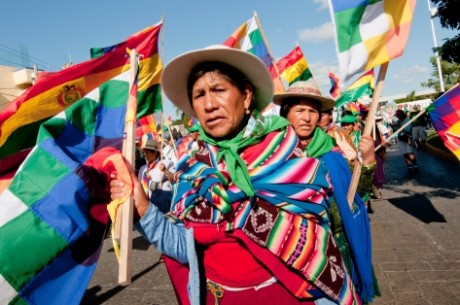 Sadly, I will not be able to be with you. Hopefully, all that is possible, and also the impossible, will be done so that the Summit of the Mother Earth becomes the first phase towards the collective expression of people who do not direct world polices, but suffer from them.
Sadly, I will not be able to be with you. Hopefully, all that is possible, and also the impossible, will be done so that the Summit of the Mother Earth becomes the first phase towards the collective expression of people who do not direct world polices, but suffer from them.
Hopefully, we will be able to carry forward the two initiatives of companion Evo [Morales, president of Bolivia]: the Climate Justice Tribunal and the World Referendum against a system of power founded on war and on waste, which scorns human life and auctions our worldly goods.
Hopefully, we will be able to speak less and do much. The wordy inflation, which in Latin America is more damaging than monetary inflation, has done us, and keeps inflicting, grave damages. And also, and above all, we are fed up with the hypocrisy of the rich countries, which is leaving us without a planet while it delivers pompous discourses to conceal the hijacking.
There are those who say that hypocrisy is the homage that vice pays to virtue. Others say that hypocrisy is the only proof of the existence of the infinite. And the babble of the so-called “international community,” that club of bankers and war-makers, proves that both the definitions are correct.
I want to celebrate, for a change, the force of the truth that words radiate and the silences born of human communion with Nature. And it is not by chance that the Summit of the Mother Earth is being realized in Bolivia, this nation of nations that is rediscovering itself after two centuries of a life of falsehood.
Bolivia has just celebrated ten years of a popular victory in the water war, when the people of Cochabamba were able to defeat a powerful Californian company, owner of their water by the grace of a government which said it was Bolivian and was very generous to those from afar.
That water war was one of the battles that this land saves for the defense of its natural resources: that is in defense of its commonness with Nature. Bolivia is one of the American countries where indigenous cultures have been known to survive, and those voices now resound with more force than ever, despite the long period of rejection and persecution.
The world, bewildered as it is and stumbling like a blind person in a shoot-out, will have to hear those voices.
These tell us, mere humans, that we are part of Nature, related to all that have legs, feet, wings or roots.
The European conquest condemned the indigenous people who lived in that communion for idolatry and, for believing in it, they were whipped, beheaded, or burnt alive.
From the time of the European Renaissance, Nature was converted into merchandise or into an obstacle to human progress. And till now, that divorce between Her and ourselves has persisted, to the point that there still are people of good faith who are moved by poor Nature, so badly treated, so hurt—but they see Her from the outside. The indigenous cultures see Her from the inside.
Seeing Her, I find myself
Whatever I do against Her, is done against myself
In Her, I find myself
My legs are also the road that they walk
Well, we celebrate this Summit of the Mother Earth. And if only the deaf do listen:
Human rights and the rights of Nature are two names of the same dignity.
Source: Yes! Magazine | Eduardo Galeano is a Uruguayan author whose books include Las venas abiertas de América Latina (Open Veins of Latin America), Memoria del fuego (Memory of Fire), and Espejos: Una historia casi universal (Mirrors: Stories of Almost Everyone).
Por Eduardo Galeano
Rebelíon
español | inglés
Mensaje del autor de Las Venas abiertas de América Latina a los asistentes a la Cumbre de la Madre Tierra que se celebra la semana que viene en Bolivia, como alternativa a la Cumbre sobre el Cambio Climático en Copenhague.
Lamentablemente, no podré estar con ustedes. Ojalá se pueda hacer todo lo posible, y lo imposible también, para que la Cumbre de la Madre Tierra sea la primera etapa hacia la expresión colectiva de los pueblos que no dirigen la política mundial, pero la padecen.
Ojalá seamos capaces de llevar adelante estas dos iniciativas del compañero Evo [Morales, presidente de Bolivia], el Tribunal de la Justicia Climática y el Referéndum Mundial contra un sistema de poder fundado en la guerra y el derroche, que desprecia la vida humana y pone bandera de remate a nuestros bienes terrenales.
Ojalá seamos capaces de hablar poco y hacer mucho. Graves daños nos ha hecho, y nos sigue haciendo, la inflación palabraria, que en América Latina es más nociva que la inflación monetaria. Y también, y sobre todo, estamos hartos de la hipocresía de los países ricos, que nos están dejando sin planeta mientras pronuncian pomposos discursos para disimular el secuestro.
Hay quienes dicen que la hipocresía es el impuesto que el vicio paga a la virtud. Otros dicen que la hipocresía es la única prueba de la existencia del infinito. Y el discurserío de la llamada “comunidad internacional”, ese club de banqueros y guerreros, prueba que las dos definiciones son correctas.
Yo quiero celebrar, en cambio, la fuerza de verdad que irradian las palabras y los silencios que nacen de la comunión humana con la naturaleza. Y no es por casualidad que esta Cumbre de la Madre Tierra se realiza en Bolivia, esta nación de naciones que se está redescubriendo a sí misma al cabo de dos siglos de vida mentida.
Bolivia acaba de celebrar los diez años de la victoria popular en la guerra del agua, cuando el pueblo de Cochabamba fue capaz de derrotar a una todopoderosa empresa de California, dueña del agua por obra y gracia de un Gobierno que decía ser boliviano y era muy generoso con lo ajeno.
Esa guerra del agua fue una de las batallas que esta tierra sigue librando en defensa de sus recursos naturales, o sea: en defensa de su identidad con la naturaleza. Bolivia es una de las naciones americanas donde las culturas indígenas han sabido sobrevivir, y esas voces resuenan ahora con más fuerza que nunca, a pesar del largo tiempo de la persecución y del desprecio.
El mundo entero, aturdido como está, deambulando como ciego en tiroteo, tendría que escuchar esas voces.
Ellas nos enseñan que nosotros, los humanitos, somos parte de la naturaleza, parientes de todos los que tienen piernas, patas, alas o raíces.
La conquista europea condenó por idolatría a los indígenas que vivían esa comunión, y por creer en ella fueron azotados, degollados o quemados vivos.
Obstáculo al progreso
Desde aquellos tiempos del Renacimiento europeo, la naturaleza se convirtió en mercancía o en obstáculo al progreso humano. Y hasta hoy, ese divorcio entre nosotros y ella ha persistido, a tal punto que todavía hay gente de buena voluntad que se conmueve por la pobre naturaleza, tan maltratada, tan lastimada, pero viéndola desde afuera. Las culturas indígenas la ven desde adentro.
Viéndola, me veo
Lo que contra ella hago, está hecho contra mí
En ella me encuentro
Mis piernas son también el camino que las anda
Celebremos, pues, esta Cumbre de la Madre Tierra. Y ojalá los sordos escuchen:
los derechos humanos y los derechos de la naturaleza son dos nombres de la misma dignidad.
Fuente: Rebelíon, 18 Apr 2010

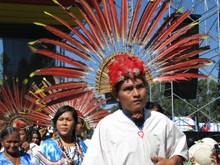
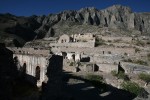
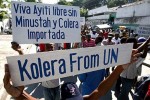

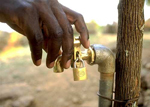


Comments
The Open Veins of Climate Change | Los derechos del hombre y la tierra — No Comments